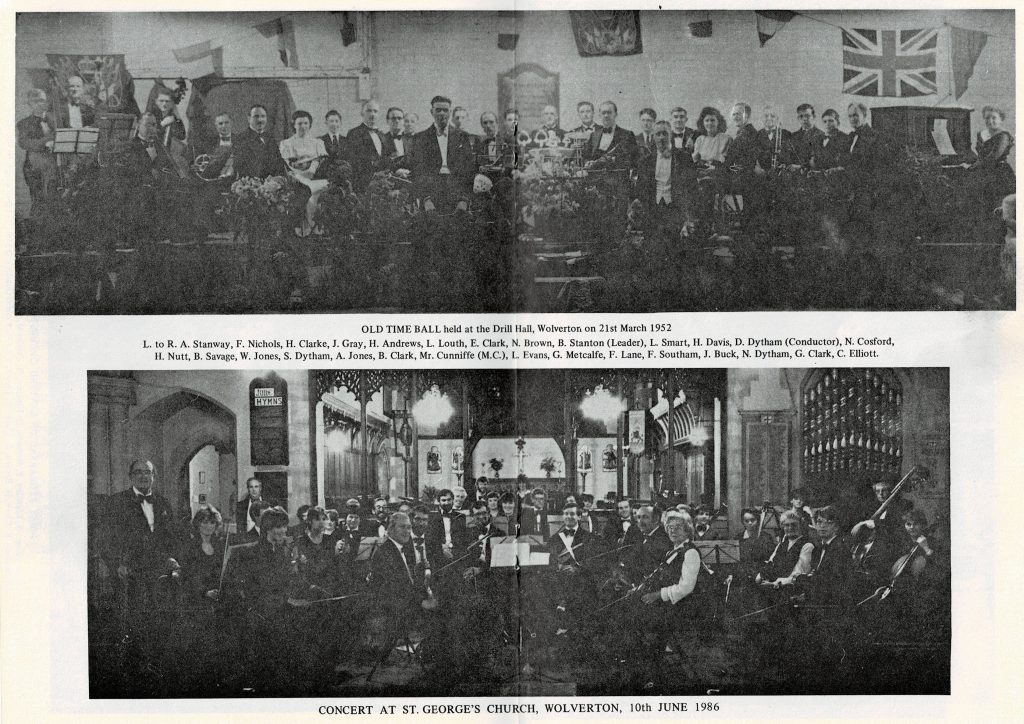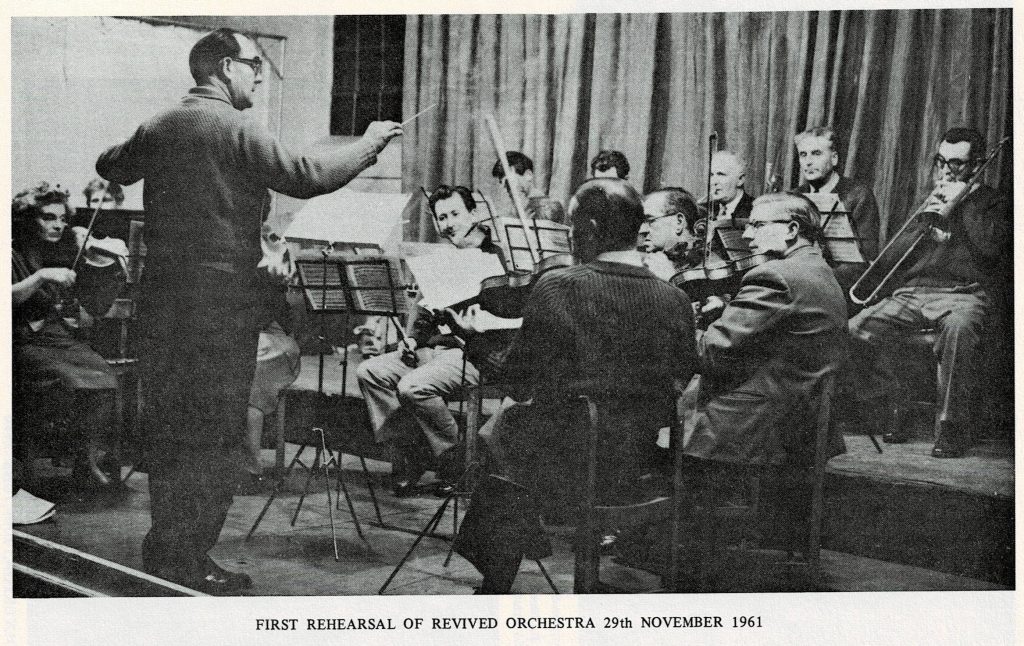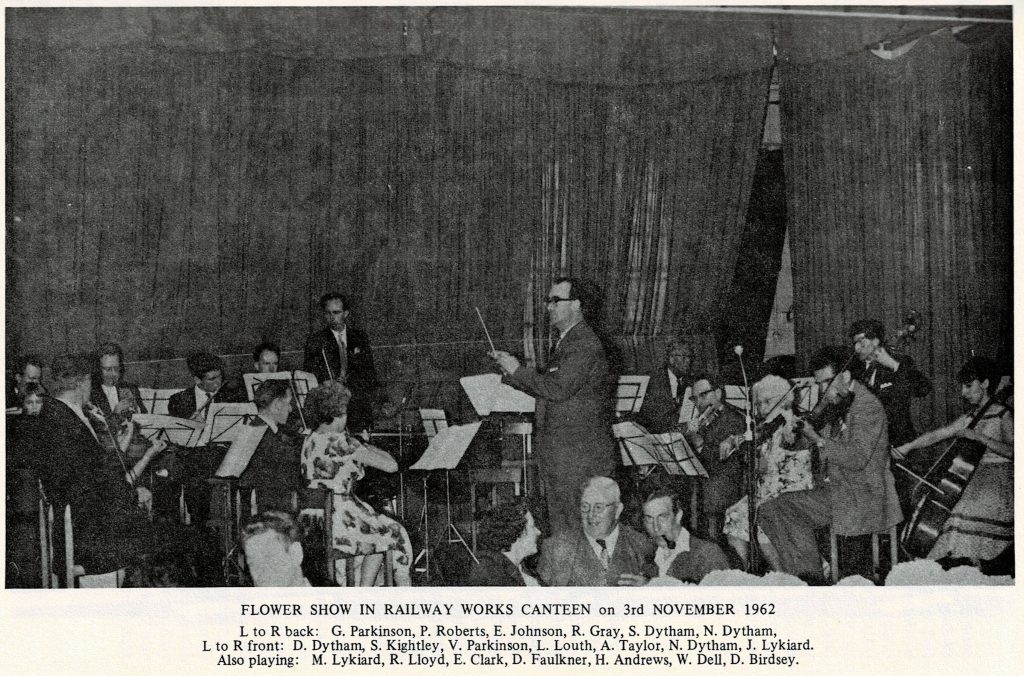This page is a replication of a small book by Arnold Jones, originally published by the WLO and printed by Stantonbury Parish Print (Milton Keynes MK14 7PL) in November 1986. Information about the author can be found towards the end of this wonderful and detailed history of the WLO. We are forever grateful to Arnold for the work and love that was put into researching and writing this fascinating origin story. We hope that you enjoy this look back at our history.
Phase 1 – The Beginning
The Wolverton Light Orchestra, formerly The Wolverton Orchestral Society, and originally The Frank Brooks Orchestra was formed in the mid-twenties by Alyn Frank Brooks who was also for many years conductor of the Wolverton Town Silver Band.
After the 1914-18 war Wolverton was a thriving country town of around 5000 inhabitants. It owed its existence to the railway works where some 4000 were employed, and to McCorquodale’s printing works which provided jobs for several hundred, mainly women. Many walked or cycled to work from the surrounding villages and the starting time was 6.00 a.m. There was a steam tram from Deanshanger and a rail link with Newport Pagnell, and of course further afield to Bletchley and Northampton with intermediate stops at Roade and Castlethorpe. Thus, Wolverton was the industrial centre of North Bucks in a mainly rural area. Although occasional trips at the weekend to Northampton and even London were possible, entertainment was mainly homegrown. Wolverton did boast a cinema, ‘The Palace’, where silent films were shown and a small variety theatre, ‘The Empire’, but musical performances were almost entirely at the amateur level. The various churches all had choirs and their organists tended to be the leaders of vocal performances, but the main instrumental group was the brass band.
Frank Brooks’ father, Mr. H.J. Brooks, who died in October 1929 had been bandmaster of the Bucks Battalion T.A. and his son was a brass player who took over the Wolverton Band in 1920 after army service during the war. In three years he had so improved its standard that they were winning prizes at contests, but he had a period away from the band returning as bandmaster in February 1930. It was during the interim that he first formed an orchestra.
The first reference to such a group in the Wolverton Express is on December 2nd 1927 when it reported on a Hospital Effort Concert ‘which featured Mr. A.F. Brooks’ Orchestral Band’. The next reference is not until February 22nd 1929 when we read of a British Legion Concert at the Picture Palace by ‘The British Legion Orchestra, conductor Mr. A.F. Brooks.
An interesting list of names follows:
Violins: J. Webb (leader), D. Dytham, S. Hinch, A. Berrill, B. Stanton
Viola: H. Davis
Cellos: E. Elmore, J. Franklin
Bass: J. Staley
Flute: S. Evans
Clarinet: C. Hardwick, V. Gillam
Horn: C. Purser
Trumpets: S. Dytham, W. Axby
Euphonium: H. Nelson
Drums: E. Nichols
Piano: G.O.W. Davies
Thus a modest start had been made with 18 players, and on March 1st the Express reports on the British Legion Dinner. “During the dinner the British Legion Orchestra under the direction of Mr. A.F. Brooks rendered selections”. The next report is on November 8th of a production of ‘In the Fog’ at the Church Institute when the British Legion Orchestra played under their conductor A.F. Brooks. Next on January 26th 1930, we read of a ‘Grand Concert’ at the Scala Cinema, Stony Stratford, ‘Mr. Frank Brooks and his Orchestra (Leader A.J. Webb)’. This is the first time that the orchestra was given this title; previously it had functioned under the auspices of the British Legion.
It was not until 1932 that we read of regular concerts.
| January 8th | Concert under the auspices of The Wolverton Town Band provided by Mr. Frank Brooks and his Orchestra at the Church Institute. |
| January 27th | Frank Brooks and his Orchestra in ‘a programme of rather outstanding quality’. Orchestra, Ladies Choir, and Soloists. Arrangements made by the Secretary, Mr. Alun Jones; the Church Institute was packed to overflowing. Proceeds were for the Town Band uniform fund. |
March 25th | £30 presented to Band for uniform fund; proceeds from series of concerts. Reference in ‘glowing terms’ to the generosity of Mr. Loft for free rehearsals at Crauford Arms Hotel. |
| April 8th | Concert with Town Band at Church Institute. |
| April 29th | Items in concert at Stony Stratford for unemployed. |
| June 3rd | Concert at Wolverton Science and Art Institute for unemployed. |
| In the Autumn | A series of six concerts was planned. |
| October 21st | Concert at Church Institute (Leader Basil Stanton). It was stated there were vacancies for a few violins. |
| November 4th | Concert at the Scala Cinema (Leader A.J. Webb). Soloists James Jones (tenor), and J. Dennehy (piccolo). These gentlemen had been transferred to Wolverton on the closing of the railway works at Newton Heath. |
| November 16th | Concert at the Chuch Institute. |
| November 30th | Concert at the Church Institute with Ban (lengthy programme). |
| December 14th | Concert. |
| December 16th | Incidental music to play by Wolverton Drama Society “The Ship”. |
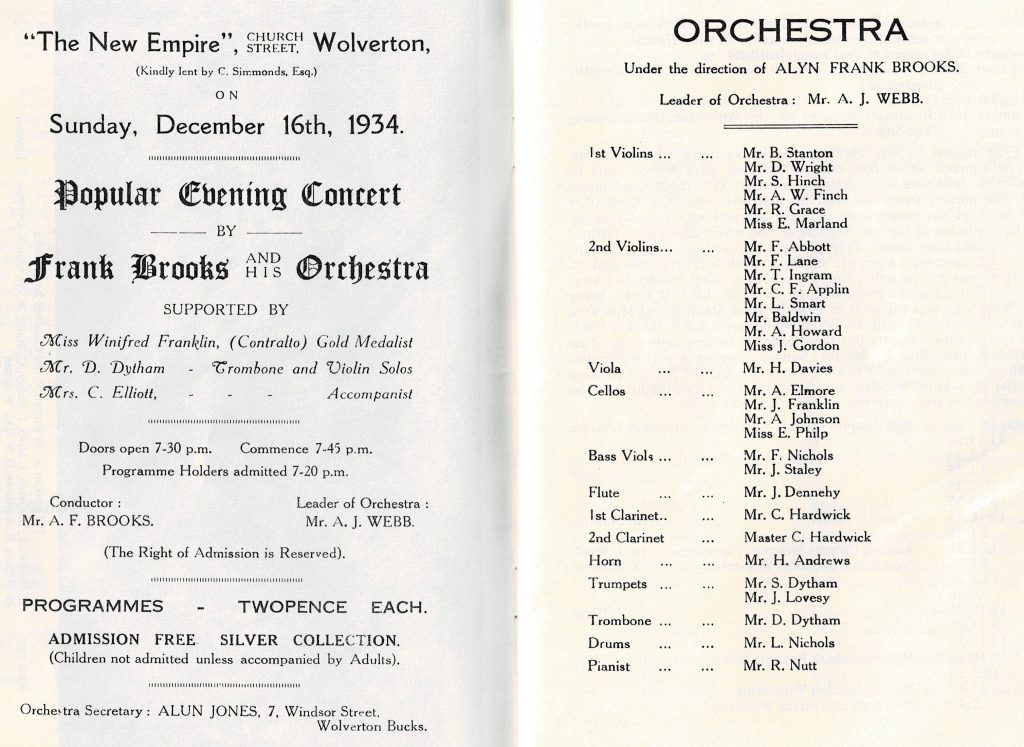
In 1933 regular Sunday evening concerts were started in the New Empire Cinema which had been refurbished after several years of dereliction following its ceasing to function as a theatre and music hall. The present writer attended his first such concert in April 1934 and has kept the programmes of these concerts which continued up to the beginning of the war. Starting at 7.45 which allowed the faithful to go straight from church, they provided a programme of popular light orchestral music with a soloist, usually a vocalist. Programmes cost 2d and there was a silver collection, the proceeds being devoted to a local charity. Frank Brooks conducted up to 1944, his first leader being A.J. Webb who was followed in 1936 by Basil Stanton, and Miss Vera Higgs who continued until she joined Ivy Benson’s A.T.S. Band in 1943, The venues varied slightly but these concerts became something of an institution providing a pleasant Sunday evening when Wolverton, although easily the largest town in North Bucks, had little or nothing to offer by way of Sunday entertainment. The following list may be incomplete but gives some idea of the orchestra’s activity.
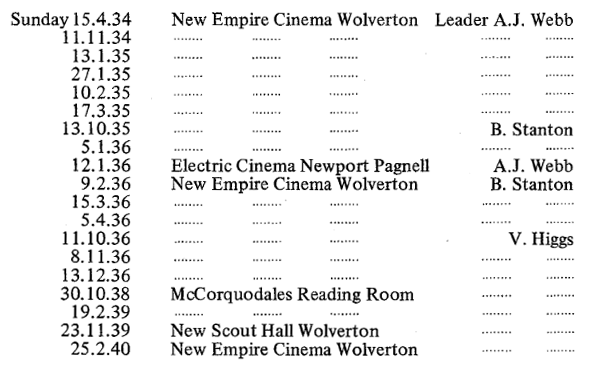
Many of the items played had a somewhat military/British Legion flavour which is not surprising considering that the orchestra sprang from such beginnings. These are specimen programmes from the years in question:
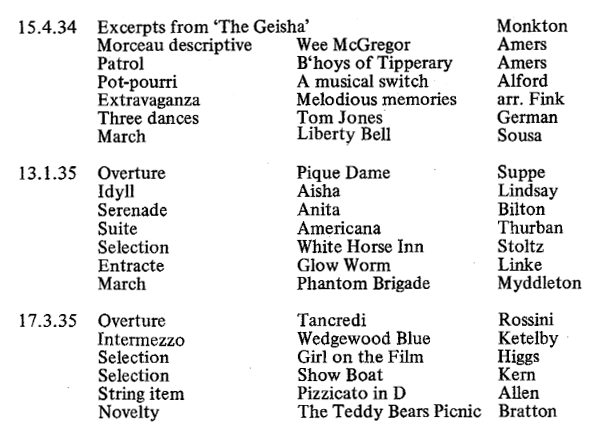
It is noticeable that selections were included reflecting popular shows of the time.
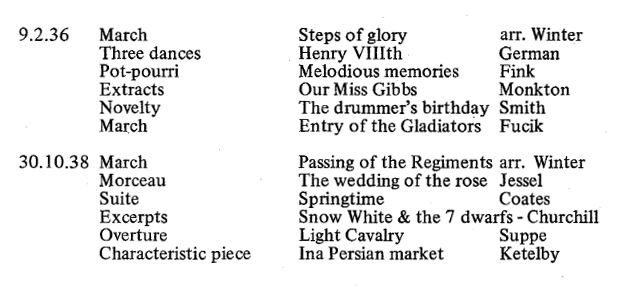
This appears to be the first more orthodox programme containing both an overture and two orchestral suites.
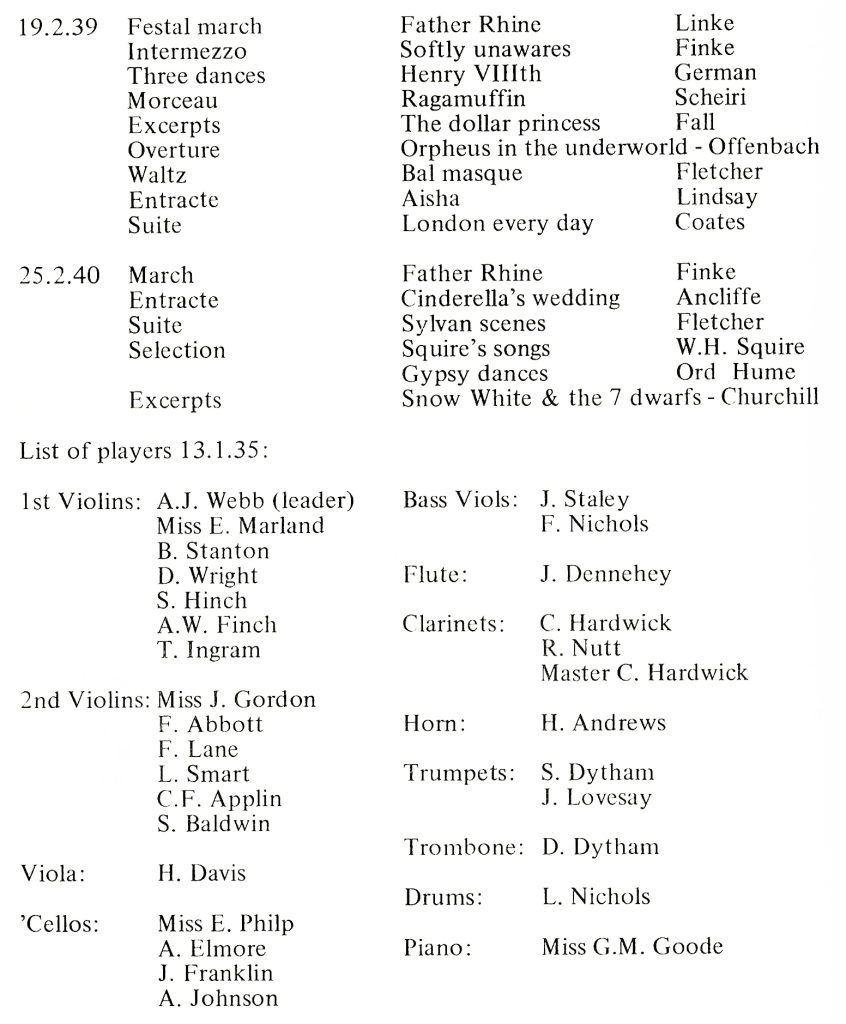
This programme lists 30 players, ten of whose names appeared on the original list, but it will be noted that there is no mention of an oboe, a bassoon or timpani, and this remained the position for the whole of the pre-war era apart from the oboe which appeared in 1939 when Harold Nutt, a talented young player who was already proficient on piano, clarinet and saxophone added oboe to his repertoire, and transferred from clarinet to fill this gap in the woodwind.
He was destined to be the next conductor and did in fact deputise for Frank Brooks who was in poor health prior to the war. He also collaborated with him in 1938 in the production of a musical phantasy in four acts, “Lionel Dennier Steps Out”. Brooks wrote the libretto and he and Harold Nutt wrote the music, most of which was orchestrated by Harold. The principal roles were sung by local amateurs including Connie Elliott and Eileen Dormer who was a dancing instructress and arranged the dances. The orchestra was led by Vera Higgs and conducted by Frank Brooks.
In April 1939 there was a dancing display by Eileen Dorner’s pupils and ‘the accompanying music was played by the Frank Brooks’ Orchestra under Mr. Brooks’ personal direction’, (Wolverton Express).
The outbreak of war in September had only a minimal effect at first and on 23rd November there was a concert for the Wolverton Christmas Fund for Men serving with H.M. Forces. However, by 25th February 1940 when another concert was put on for this worthy cause there was an acute shortage of woodwind. New names had appeared and the players were: V. Higgs (Leader), D. Dytham, B. Stanton, S. Louth, K. Verall, S. Glave, A. Plummer, F. Lane (violins), H. Davis (viola), A: Johnson, E. Elmore (cellos), F. Nichols, J. Staley (double basses), H. Andrews (horn), S. Dytham, W. Axby (trumpets), J. Malone (trombone), L. Nichols (percussion), C. Elliott (piano).
On 24th March 1940 a concert for the benefit of the British Legion was given in the New Empire Cinema, Players were: Vera Higgs (Leader), D. Dytham, F. Sharp, K. Verall, 8. Louth, F. Lane, A. Plummer (violins), H. Davis (viola), E. Philp, A. Johnson, E. Elmore (cellos), F. Nichols, J. Staley (double basses), G. Webb (flute), C. Hardwick, D. Nutt (clarinets), H. Andrews (horn), S. Dytham, W. Axby (trumpets), J. Malone (trombone), L. Nichols (percussion).
Miss E. Philp By the Autumn of 1940 the loss of players serving in the Forces had seriously affected the personnel of the orchestra, and regular rehearsals and concerts were not possible as war work/overtime working, Civil Defence and Home Guard duties etc. fully occupied people’s time. However, the orchestra continued to operate from time to time on an ad hoc basis. Such players as H. Nutt, L. Smart, D. Wright and B. Stanton had long since departed, and the writer himself was called up in the July for army service. Thus the Wolverton Express must be relied upon again for detailed information of cultural activities on the home front. It is noted that ten players performed for a Home Guard smoking ‘concert at the Drill Hall on December 30th. In parenthesis, it should be stated that the Town Band had survived in the guise of the Home Guard Band. Dougias Dytham was Bandmaster although Frank Brooks conducted some concerts.
In 1941 the only concert reported was in the Social Club on February 16th. In September Vera Higgs married George Parkinson, a clarinet player in the Tank Corps Band, who was to become a regular player with the orchestra after the cessation of hostilities.
Four occasions are mentioned in the Express in 1942, the first taking place on 20th February in the Science and Art Institute in aid of Warship Week. There was an audience of 200. ‘Frank Brooks personally conducted 27 musicians’. Charles Wilson was pianist. On 19th August items were contributed at a benefit concert in the Church Institute. A.J. Webb was leader and Charles Wilson pianist. On 12th November a concert was given in the Veterans Institute which was much enjoyed. On 13th December a concert was given in McCorquodales’ Reading Room for the Works Forces Fund. Frank Brooks full orchestra was again led by Vera Parkinson. C. Wilson was the pianist.
In January 1943 Vera joined Ivy Benson’s A.T.S. Band having led the orchestra from 1936. On 14th February the orchestra was assembled to provide seven items in Alyn F. Brooks Guest Night, in aid of the Merchant Navy Comforts Fund. The star attraction was Stanley Holloway, and Musician R. Nutt (Beds. & Herts. Regiment) appeared to play oboe, accompany soloists and contribute the Warsaw Concerto as his solo item.
He also brought two clarinet players with him, and a horn player, the others being D. Dytham (Leader), G. Bennett, R. Grace, S. Louth, C. Tompkins, D. Parker, R. Percival (1st violins), F. Lane, C. Rix, W. Bowles, J. Clamp (2nd violins). H. Davis (viola), H. Elmore, E. Philp (cellos), F. Nichols, J. Staley (double-basses), J. Dennehey (flute), H. Nutt (oboe), H. Andrews (horn), 8. Dytham, T. Chaytor (trumpets), J. Malone, F. Southam (trombones), W. Jones (drums), C. Wilson (piano). There was an audience of 400,
There were only two minor events recorded in 1943 these being a Dancing Display by Eileen Dormer on the 18th March in aid of the Merchant Navy Comforts Fund when the orchestra gave ‘musical support’; and on the 10th November when items were contributed at an A.R.P. Social at the Craufurd Arms Hotel.
The only event reported in 1944 was a ‘Workers Playtime’ during the midday break in the Railway Works Canteen when Mr. Frank Brooks’ Orchestra provided the programme.
No concerts were reported in 1945 but the writer has a programme of a ‘grand’ COMING OF AGE CONCERT taking place on Sunday, March 25th by Frank Brooks and his Orchestra supported by Madame Anne Chadwick and Tom Barker. This interesting souvenir was supplied by Basil Stanton who played in the original British Legion Orchestra and led at various times during the thirties. In a letter he writes: “My recollections of Frank Brooks’ Orchestra, and of course the British Legion Orchestra, bring back many happy memories — the Sunday morning rehearsals in the Crauford Arms, and of course the concerts in the various venues on Sunday nights. The concerts were mostly well attended, and there was a nucleus of regular patrons, with whom we used to chat during the intervals. It was a great pleasure to play for such enthusiastic audiences. And, of course, it was good entertainment. It was a very friendly orchestra, as proved by the continuity of the players over the years. The experience I gained with the Orchestra stood me in good stead later on — in the RAF, I was playing with Sidney Torch at Blackpool, from where we did a number of broadcasts, and with Myers Foggin and the RAF String Orchestras. He now lives at Wallington, Surrey where he has been active as a player in the Croydon Symphony Orchestra at one time under Norman del Mar, in theatre orchestras and was for some years leader of the Sutton Symphony Orchestra.
On 23rd November 1945, the Wolverton Express ran a feature on Harold Nutt and reported that ‘he has recently accepted the post of conductor of the Frank Brooks’ Orchestra, the founder having resigned owing to ill health’. So ended an era.
Before passing on to the post-war period due credit should be given for the contribution to local: entertainment and culture made by the orchestra during the 18 year period of Frank Brooks’ conductorship. The proceeds from the concerts were always devoted to local charities and something in the region of £1000 was raised during this period.
The establishment of an orchestra of 30 players in a small town such as Wolverton was quite an achievement in the period between the wars, bearing in mind the fact that life for an instrumentalist then was more difficult than nowadays. Brass players could obtain free tuition and an instrument on joining a band but string and woodwind players were not so fortunate. Having acquired an instrument, tuition could present a problem. Most homes had a piano and there were a number of piano teachers, but there were far fewer opportunities for would-be orchestral players. True there were several string teachers limited mainly to violin and viola, and perhaps ’cello, but woodwind teachers were rare. Flute and clarinet could be catered for but not oboe or bassoon, or for that matter french horn or timpani. Instrumental teaching in schools was a rarety and then a paid ‘extra’ and therefore only for a minority; so it was much harder to bring together a chamber music group than now, let alone an orchestra.
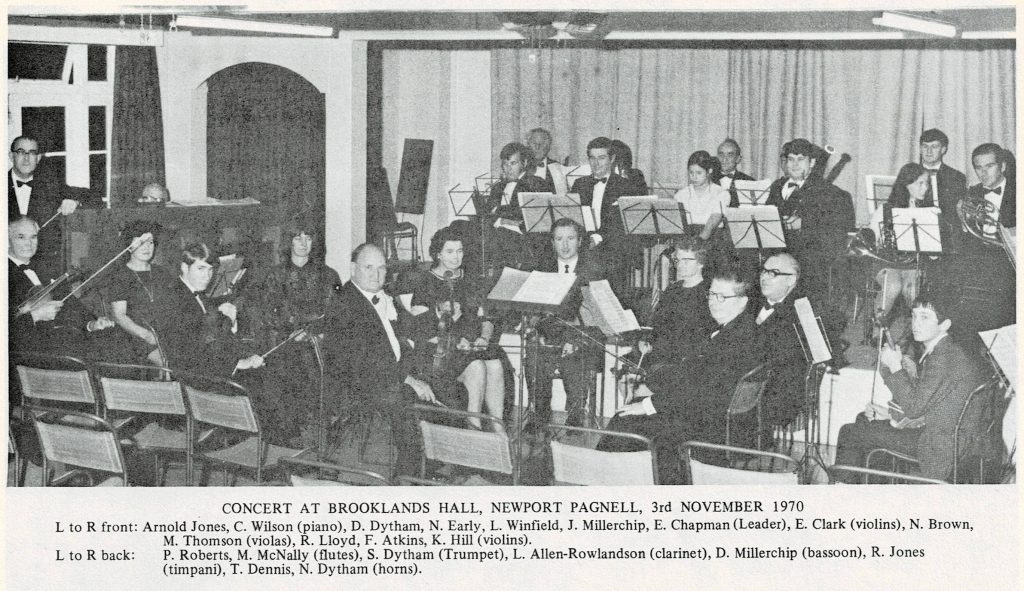
Phase Two
In 1946 players were returning from the forces with added experience and ability, and regular rehearsals restarted with Harold Nutt as con- ductor. He had spent the war years as an instrumentalist in the Beds. & Herts. military band, based at Bedford where the B.B.C. Symphony Orchestra under Adrian Boult was also located for several years before moving to Bristol; and he also played second oboe to Helen Gaskell in that orchestra. He played in the Bedford Symphony Orchestra and had conducted them in works he had composed. With this background, he was the obvious choice to succeed Frank Brooks as conductor of the Wolverton Orchestra. He had just returned to teaching and was music master at the Wolverton Grammar School. He had great energy and enthusiasm and tried to improve the type of music played. In this, he succeeded to a great extent as programmes of this time demonstrate. One of his first concerts was at the Bletchley Community Centre on 21st April when the programme included Mendelssohn’s ‘Hebrides’ Overture and Grieg’s ‘Peer Gynt’ Suite. On 10th November there was a concert in the Railways Works Canteen with the Musical Society Choir which was also conducted by Harold Nutt. This programme concluded with a performance of ‘Hiawatha’s Wedding Feast’ by Coleridge-Taylor for chorus, orchestra, and solo tenor, the soloist being the orchestra’s present conductor Arnold Jones. He too had recently returned from six years of service with the Royal Army Pay Corps. Most of this time he had fortunately spent in the very musical seaside town of Bournemouth where he came under the influence of Dr. Reginald Jacques and Roy Henderson and had improved and developed his singing. He had also acquired a clarinet from the principal player in the Bournemouth Orchestra, so he joined the Wolverton Orchestra as second clarinet thus beginning his 40-year association with it. Here is a specimen programme dated 16.3.47.
Overture Tancredi Rossini
Suite English Folk Songs Vaughan-Williams
Selection Cavalleria Rusticana Mascagni
March Fame and Glory Matt
Entracte Rosamunde Schubert
Selection Waltzes from Vienna Strauss
About this time the orchestra acquired the services of a talented musican Wilfred Norris, who was a fine organist and flautist. He felt, like Harold Nutt, that better music should be attempted, and also that the image of the orchestra could be improved. To that end he proposed a change of name to ‘The Wolverton Orchestral Society’ and this was agreed by the membership. However, Frank Brooks and his associates objected to the dropping of the name of the founder, and even threatened legal action to prevent this by putting a restraint on the assets of the society. These included a piano, music stands and a very considerable music library. A joint meeting was called and after heated exchanges it seemed that an impasse had been reached. However, a simple compromise was suggested, and it was amicably agreed that the name should read ‘Wolverton Orchestral Society (Founder Frank Brooks)’. This continued for a number of years until after the death of the founder. The new constitu- tion of which the author has a copy was dated May 30th 1948. Good- will existed as evinced by the fact that Frank Brooks appeared as guest conductor at a concert on November 7th. Concerts were now often given in the relatively small Scout Hall and the programme on 6.3.49 included the following orchestral items:
Overture Maritana Wallace
Ballet Coppelia Delibes
Entracte Rosamunde Schubert
Suite The Water Music Handel
The programme also included Haydn’s Trumpet Concert played by Sydney Dytham, a founder member who later became chairman. The players at this concert were:
D. Dytham (Leader)
1st violins: L. Smart, L. Louth,B. Stanton, Mrs. V. Parkinson, J. Exton, Miss E. Metcalfe
2nd Violins: F. Lane, L. Evans, Miss G. Metcalfe, G. Clark, N. Dytham
Violas: N. Cosford, H. Davis, N. Brown
Cello: H. Clark
Double Bass: A Stanway, F. Nichols, J. Gray
Flute: J. Dennehey
Oboe: W. Lilliford
Clarinets: C. Hardwick, A.W. Jones, J. Buck
Horn: H. Andrews
Trumpets: S. Dytham, B. Clark
Trombone: F. Southam
Percussion: W. Jones, K. Savage
Piano: C. Elliott
The orchestra at this time included two outstanding teenage musicians John Gray and John Exton who were both pupils of Harold Nutt and Wilfred Norris at the Grammar School. Both went on to achieve success, Exton in the academic field becoming a fellow of Kings College, Cam- bridge and subsequently emigrating to Australia, where he is now Professor of Music in the University of Perth; and Gray, after studies at the Royal College of Music and graduateship, went straight into the C.B.S.O. and then as sub principal double-bass with the L.S.O. He too left these shores and is Head of Double-Bass studies at the New South Wales State Conservatorium of Music in Sydney, Australia.
After this concert, Jim Dennehey, who had been a unique character in the orchestra for 17 years, had to give up playing, and as Wilf Norris too departed to teach at Oakham School it was without a flute, although there was an oboe and two clarinets. A young player, Wendy Holdom, was found but then W. Lilliford (oboe) left the district and thus the woodwind continued at the minimal strength of three players. In these circumstances, a pianist was essential, particularly for rehearsal, and Mrs. Connie Elliott was for many years a valuable asset in this role. She was also a very competent accompanist and much in demand locally as such; on the other hand, she was equally talented in the dramatic arts.
Harold Nutt was for several years music master at the Royal Latin School, Buckingham and between 1947 and 1950 concerts were given by the orchestra in the Town Hall. He was also conductor of the Wolverton Choral Society and for some years the orchestra accompanied the choir in concert performances viz:
1948 Carmen Bizet
1949 Tom Jones Edward German
1951 King Olaf Elgar
1952 The Creation Haydn
1953 Messiah Handel
1954 St. Matthew Passion J.S. Bach
In addition to his post as Head of Music at the Wolverton Grammar School, he was, for many years, Director of Music at the Thornton Convent School, and the orchestra made periodic visits to give concerts. Some concerts were given in the Wolverton Railway Works Canteen, which was large but in all other respects quite unsuitable and furnished with acutely uncomfortable chairs, possibly designed to discourage employees from spending too long over their refreshment. There was still a link with the British Legion and concerts including a Remembrance Festival on November 8th 1953 were performed there. Other venues in Wolverton were the Church Institute and the nearby Science and Art Institute, burnt down in more recent years. On 28.4.50 the following items were rendered in the former building:
Overture Tancredi Rossini
Suite English Folk Songs Vaughan-Williams
Suite Nell Gwyn German
Selection Chu Chin Chow Norton
Overture The Caliph of Baghdad Boildeau
Suite In Malaga Curzon
Suite L’Arlesienne Bizet
March Pomp & Circumstance No. 4 Elgar
Several celebrity concerts were given during this period and the first on 6.9.50 featured the popular violinist Tom Jenkins at the Science and Art Institute. Orchestral items on this occasion were:
Overture Maritana Wallace
Ballet Music Rosamunde Schubert
Suite Woodland Pictures Fletcher
Grand March Tannhauser Wagner
Ballet Suite La Source Delibes
Selection The Mastersingers Wagner
Isobel Baillie appeared with the orchestra on 20.5.51 at the Works Canteen, the orchestral items being:
Overture The Magic Flute Mozart
Suite English Folk Songs Vaughan-Williams
Suite The Water Music Handel
Operatic Extract Danceofthe Tumblers Rimsky-Korsakov
A successful Old Time Ball was held in the T.A. Drill Hall on 21.3.52, and another in February 1954 for the benefit of Harold Davis, a former secretary and viola player who was terminally ill.
After this event little was attempted in 1954 apart from playing for the St. Matthew Passion in April. At the A.G.M. in January 1955 an Easter dance was planned but did not materialise. Rehearsals were poorly attended and the weekly rehearsal time altered from Sunday morning to Tuesday evening did not improve matters. Nine members were present at the A.G.M. held on Sunday, 7th January 1956 and a rehearsal was called for Tuesday 15th. It is recorded in the minutes that ‘only 4 turned up to play and those who had suggested Tuesdays did not come’. Thus interest had waned and inevitably the orchestra’s activity lapsed for what was to prove a period of nearly six years.
The leader for most of the Harold Nutt era was Douglas Dytham who had played violin or trombone from the early days of the orchestra. He was also involved with the Brass Band and led the popular Rhythm Aces Dance Band from its formation for 50 years until 1984.
Deputy leader for this period was Louis Smart who was a regular and valued player. Also prominent in the 1st violins was Betty Clark (nee Metcalfe) who became leader for a short period in 1954. Thus over a period of nearly 50 years, there had been only two conductors and five leaders.
The Third Phase
After the war the orchestra had rehearsed in the concert hall of the Wolverton Social Club in the Stratford Road. Its piano was housed in this room, and also a considerable music library, music stands etc. were stored on the premises. After a lapse of five years, the club committee contacted the ex-officers to request that the piano be removed as the room was to be used for Bingo. The old committee was reconvened and decreed that a meeting should be called to authorise the sale of the piano and disposal of the other assets. This was held in November 1961, but a new enthusiasm was evident and the members determined to revive the orchestra and find a new venue for rehearsals. Mr. E.S.D. Moore presided and new officers and committee were elected with Mr. S. Dytham as chairman, Mr. S. Louth as secretary/treasurer, Mr. Arnold Jones as conductor, and Mrs. Vera Parkinson as leader. A letter was sent to Mr. G. Tew of the B.R. works seeking permission for the use of the Works Canteen for practices, and this was subsequently granted. Thus Bingo was really responsible for the revival of the Wolverton Orchestral Society after five years of inaction. The Wolverton Express commented: “For 30 years Frank Brooks and his Orchestra gave immense pleasure to music lovers all over North Bucks. The five-year ‘refrigeration’ period caused a big gap. But there is every hope that once more people will be able to go to concerts of popular music played and conducted by local musicians — thanks indirectly to Bingo!”’ The first rehearsal took place on 29.11.61 with only 12 players, these being Vera Parkinson, Betty Clark, Stan Kightley and Bob Lloyd, violins, Norman Brown viola, Horace Clark ’cello, Peter Roberts flute, David Faulkner clarinet, Harry Andrews horn, Syd Dytham Trumpet, Bill Dell trombone, and Derek Birdsey piano. Numbers soon increased to over twenty and the first appearance of the reformed group was at a flower show in the Canteen on 22.9.62, and again at a late flowering show on 3.11.62. This was a historic occasion in as much as the con- ductor had secured the services of Mr. Rex Gray, music master at the Royal Latin School, Buckingham with a pair of timpani, the first to be seen locally. The orchestra did not include timpani until 1965 when the conductor’s 13-year-old son learned to play them during an illness that confined him to the house. The first concert proper was given in the Moon Street School on 11.12.62, and on 18.12.62 the orchestra played in St. Giles Church, Stony Stratford; so, in under 12 months, it was back in its stride.
In the years that followed a pattern of concerts was established in local schools, churches, village halls, etc., programmes consisting of popular orchestral items with a soloist or school choir providing variety. The orchestra also travelled further afield and gave concerts in Northampton and its villages such as Wollaston, Duston, Nether Heyford, Road, Yardley Gobion, Potterspury and Deanshanger; and in the North Bucks area such as Newport Pagnell, Tyringham, Woburn Sands, Cos- grove, Nash, Great Horwood, Shenley and Thornborough; this being on 19th December 1978 in a freezing church when one lady viola player was observed to be playing in gloves. On 21.11.72 we occupied the pit at the Royal Theatre Northampton to provide incidental music for a Gala performance of Mansfield Park by Jane Austen. In December 1977 a Christmas concert was given in the Wolverton Methodist Church and this has become an annual joint event with the Wolverton Gilbert and Sullivan Society. Similarly, regular concerts are also given in Bletchley and other parts of Milton Keynes, and in November 1984 we performed in the Concert Hall of the University of Buckingham.
Leaders
Vera Higgs who was leader before the 1939-45 war, and as Vera Parkin- son was reappointed in 1961 was an enthusiastic musician and a very competent player. However, she contracted cancer and died in 1969 after several operations and a long and painful illness. She showed great courage and determination and continued to play long after most would have given up. At the A.G.M. on 6.1.70 Eric Chapman was appointed leader. He had joined the orchestra when living near Buckingham and continued regularly to make the long weekly trip from Nether Heyford when his work necessitated his removal to Northamptonshire. He was a most conscientious leader until his resignation in 1976. In the September Stanley Kightley was appointed and has now completed ten years as leader, and is the only member from the 1961 orchestra still playing. This period has more or less coincided with the arrival and expansion of Milton Keynes which has transformed the local musical scene.
Previously, indigenous music consisted mainly of concerts by the Brass Band, the Orchestra and local Choral Society, plus school productions of G. & S. and light operas. Now, in a city of over 100,000, there are two choral societies, numerous smaller choral groups, two G. & S. societies, an operatic society, a number of brass bands and a symphony orchestra, in addition to the Light Orchestra. Consequently, standards have risen, and the public is better informed and expects a higher standard of amateur presentation. The establishment of two music centres in the city has done much to educate and produce a steady stream of talented young players who eventually make a useful contribution to local orchestras and bands. More and better adult players have also come into the area and this too has had a beneficial effect on the Orchestra. With the cooperation of the players, the conductor has been able to modify the image and improve the standards of playing and repertoire. With this object in mind in September 1977 it was decided to rename the orchestra as a Light Orchestra, an indication of the type of music played, there now being another local orchestra performing symphonic music. Also, it was felt that the term ‘orchestral society’ now had a somewhat outdated and archaic ring to it.
Pianists
In a light orchestra of around 30 players, the piano can be a useful addition, particularly in rehearsal when key instruments are missing; and at concerts when a good accompanist for a vocal soloist is essential. As stated earlier the Frank Brooks Orchestra had such stalwarts as Jack Ridgeway, George Davies and Miss G.M. Goode; during the Harold Nutt era there was Mrs. Connie Elliott and Jim Philo; and in recent years there have been five competent pianists. On the orchestra’s revival, the pianist was Derek Birdsey who had recently been demobilised from an army band where he played French horn. In 1964 he was replaced by Charles Wilson who had played during the early forties. However, failing eyesight forced him to resign in 1972 and the orchestra was fortunate then to obtain the services of Stan Jones, a very versatile musician who was equally at home with the classics, in the Rhythm Aces Dance Band or at a church organ. He was organist at St. George’s Church Wolverton. When he died suddenly in 1978 he was difficult to replace, but Lewis Clark, an outstanding local pianist and accompanist helped the orchestra over a difficult period until in 1979 he too had to relinquish the post due to failing eyesight. He still rarely misses a local concert and is a very active Vice-President. Alan Rainbow took over in 1979 and has continued ever since. He is less in demand in the orchestral works now being played but is invaluable as an accompanist and a great help in rehearsal when instruments are lacking.
The orchestra finally acquired a bassoon player in 1970 and now has strings, double woodwind, brass, percussion and timpani players. The programmes this year have included:
Overture The Barber of Seville Rossini
Andante Military Symphony Haydn
Valse Triste Sibelius
Perpetuum mobile Johann Strauss
Overture Plymouth Hoe John Ansell
Saxo Rhapsody Eric Coates
3 Bavarian Dances Edward Elgar
Suite Dances from Henry VIII Edward German
Anniversary Year
As stated at the outset, the orchestra was founded in 1927. Hence this is its diamond jubilee year. As the present conductor was appointed in November 1961, this is his 25th anniversary and it was this coincidence that prompted the production of this short history. The first concert of this year was the 1985 Christmas concert when he was presented with a framed certificate conferring honorary life membership, a unique distinction in the annals of the orchestra. Fittingly the presentation was made by his predecessor, Harold Nutt, now President of the orchestra, who also conducted an item at the concert as did Robert Jones, the assistant conductor.
At the June concert in St. George’s Church, Wolverton, an innovation was made when for the first time the soloist was a saxophonist who played Eric Coates’ Saxo Rhapsody with the orchestra. This was Colin Cowles, a talented player from the Aylesbury area who is also making a name as a composer. His composition ‘Romance’ was also played and received an enthusiastic reception. The orchestra who posed for the photograph at the conclusion comprised the following:
1st Violin: Stan Kightley(Leader), Carolyn Amos, Peter Carey, Emily Kragh, Karen Williamson
2nd Violins: Muriel Marriott-Unsworth, Christopher Hardacre, David Manton, Mary Thomson
Violas: Robert Jones, Antony Mynards
Cellos: Maxine Brittain, Glynis Farr, Rosamunde Whatmore
Double Basses: Nicholas Dytham, Tina Ralston
Flutes: Mary McKinnel, Melanie Page, Roger Whatmore
Oboes: Julie Gillam, Chris Carey
Clarinets: David Smith, Christine Lambert, Shaun O’Reilly
Bass Clarinet: Kathy Cowles
Bassoons: lan Every, Lucy Wood
Horns: Susan Charlesworth, Martin Buckle, David Lack
Trumpets: Lyndon Reev, Lawrence May
Trombones: Norman Curtis, Mike Crofts, Martin Wakeley
Timpani & Percussion: Roger Smith, Tina Kenny
Deputy Conductors
In 1971 two deputies were appointed, Douglas Dytham who had a long association with the orchestra from its earliest days, and Robert Jones son of the conductor who was studying music prior to training as a music teacher at Westminster College, Oxford. He had been sole deputy conductor since 1974 and the job has recently been designated assistant conductor as he regularly conducts items at most concerts, the con- ductor having held the office for 25 years (1986) welcoming some relief on the rostrum and at rehearsal.
Players
None of the present players date back to the pre-war era, and only the present conductor and leader were active members following the 1939/45 conflict and again at the reformation in 1961 and since. Frank Brooks is remembered as a somewhat stern, military-style con- ductor, who would tolerate no nonsense, but was popular with his players. His deputy was Fred Nichols, known as Shem, a pianist and player of a unique three stringed double bass viol. Jimmy Dennehey, a flute and piccolo player of Irish extraction, was a legendary character. Arthur Stanway, a diminutive double bass player of the immediate post-war era always seemed overshadowed by his instrument. He was a northerner of unpredictable temperament, who worked in the under-frame shop of the Railway works. He was a good musician and wrote several light pieces including his ‘Watling Street’ march. Harry Andrews played the horn under all three conductors and was also noted for his musical temperament, not to be confused with ‘equal temperament’. Sid Brace appeared in the 1970s as a violinist, having played at one time in the Bournemouth Orchestra. However, it transpired that he also played viola and *cello, and was quite adaptable to all three which he cheerfully undertook to do as the occasion demanded. When the orchestra became short of an oboe he acquired and taught himself to play this instrument although essentially he was a string player. When he died in 1977 he was sadly missed for his cheerful disposition and adaptability. Mention has been made of the Dytham brothers who played throughout the pre and post-war periods. Doug, as a violinist and leader, and Syd as a trumpet player who was chairman from the outset of the third phase until his death in 1979. Their sons have carried on the tradition, Neil as a violinist and one-time secretary and Nicholas who plays double bass.
The main event of the 1986 season will be the special anniversary concert to be held on November 25th in the Wesley Centre, Wolverton. Invitations have been sent to former members and those who are able including former leaders are expected to attend. The programme will include items performed at concerts over the last 60 years.
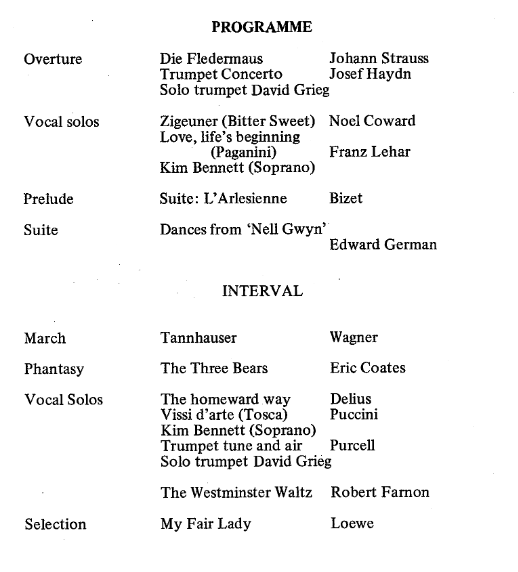
The Author
Arnold Jones received his early music lessons from his mother who was a professional piano teacher with the A.L.C.M. diploma. He started singing in his teens and was in demand locally as a soloist. He also played the piano in various groups. After the war in 1950, he was appointed organist/choirmaster. of the Wolverton Methodist Church, a position he still holds. In 1954 he conducted his first ‘Messiah’ (with orchestra) at the church and annual performances until 1976. He also conducted Mendelssohn’s ‘Elijah’ (twice) and concert versions of secular works. including Bizet’s ‘Carmen’, Edward German’s ‘Merrie England’ and ‘Tom Jones’, and a number of the Savoy operas all with orchestra.
Thus, when he took over the conductorship of the Wolverton Orchestral Society in 1961. he was not without experience of orchestras, both asa player and conductor, and had considerable knowledge of choral music.
He has always been keenly interested in vocal music and for the past 12 years has been the Musical Director of the Wolverton and District Gilbert & Sullivan Society. He was largely instrumental in the formation of this group having called the inaugural meeting in 1974. He also conducted the Newport Singers for several years from their formation in 1965.
The anniversary concert planned for 25th November 1986 will be the 195th occasion on which he has conducted the orchestra.
